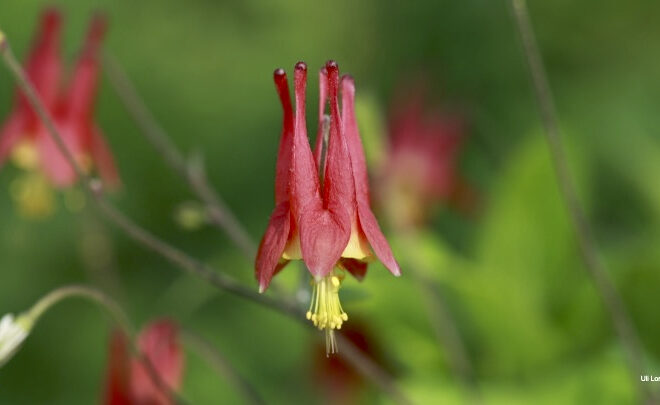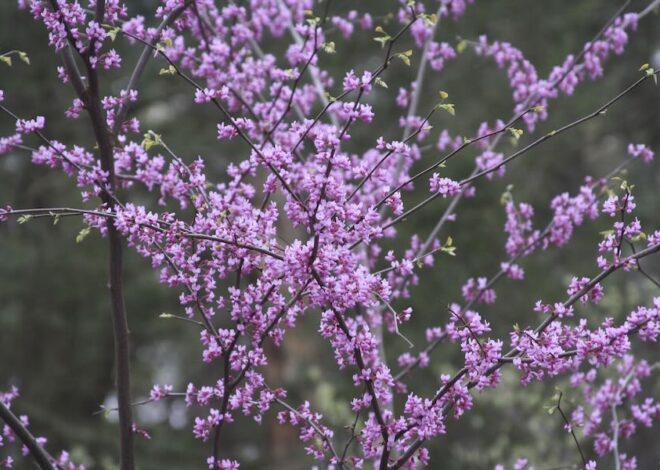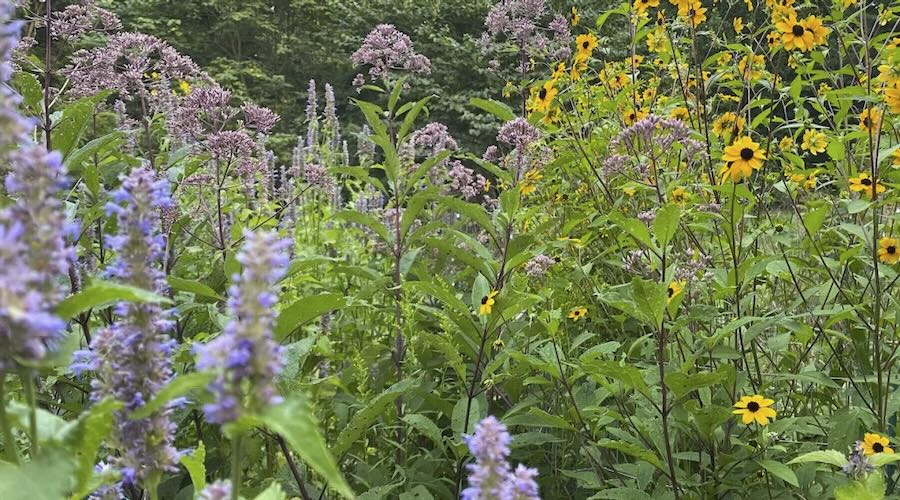
is your panorama ‘undergrown’? with nancy lawson
[ad_1]
 AS SHE OFTEN DOES, naturalist and nature creator Nancy Lawson—perhaps acknowledged greater as a result of the Humane Gardener after the title of her first e-book—caught my consideration the alternative day.
AS SHE OFTEN DOES, naturalist and nature creator Nancy Lawson—perhaps acknowledged greater as a result of the Humane Gardener after the title of her first e-book—caught my consideration the alternative day.
“My yard isn’t overgrown and neither is yours,” Nancy wrote on Instagram. What she went on to say is that phrases like overgrown are the kind which might be usually utilized negatively to landscapes that don’t match the manicured model, the one dominated by the mindset of the Good American Backyard.
Nevertheless Nancy Lawson takes exception, countering with the thought that the majority landscapes are in actuality undergrown, as in lacking selection and life.
Naturalist Nancy Lawson is author of “The Humane Gardener,” after which moreover of the e-book “Wildscape” (affiliate hyperlinks). When she and her husband bought their Maryland residence practically 25 years previously, it was one thing nonetheless a wildscape. And he or she vividly remembers that the 2.23 acres featured, in her phrases, “practically 2 acres of mowed turf and considerably tiny, sickly rose bush.”
Not anymore.
What does the language we’re using about our landscapes say—and are we really using the proper phrases?
Plus: Enter to win a replica of her latest e-book, “Wildscape,” by commenting throughout the subject near the underside of the online web page.
Study alongside as you take heed to the Jan. 29, 2024 model of my public-radio current and podcast using the participant underneath. You can subscribe to all future editions on Apple Podcasts (iTunes) or Spotify (and browse my archive of podcasts proper right here).
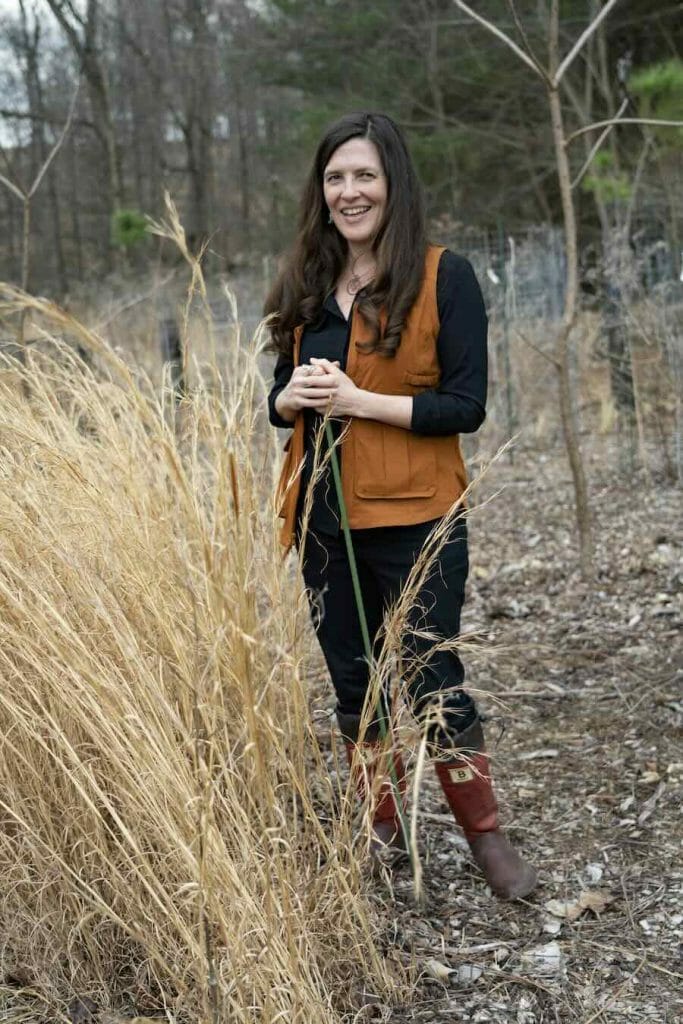

the language of the panorama, with nancy lawson
Margaret Roach: Hi, Nancy. How is it down there throughout the wildscape in Maryland? Good?
Nancy Lawson: Hi, positive, it’s great. The birds are all of their heated fowl baths exterior.
Margaret: [Laughter.] Yeah, lots of birds this yr. We’ve had merely had a cold snap and boy, some days merely mourning doves alone, there’d be 40 or 45 mourning doves other than all folks else, there’d be over 100 birds at a time visiting to drink—I maintain water accessible as properly—and to feed.
Nancy: That’s nice.
Margaret: Yeah, it’s satisfying. Makes all of it make sense considerably bit or one factor.
Nancy: Yeah. I like to look at them lining up, taking their activates the fowl bathtub [laughter].
Margaret: And the literal pecking order; some species are bossier than others [laughter].
Nancy: Positive. That’s true.
Margaret: Who’s in price? Yeah. So as I acknowledged throughout the introduction, your present publish on Instagram is the place I had initially seen it, however it’s in your web page in further depth. It really caught my ear. And I want to first set the scene for a lot of who couldn’t have study it. And likewise you start with: “My yard isn’t overgrown and neither is yours. The reality is, in the event you occur to’re like most Individuals, I’d enterprise to say that it’s additional likely undergrown.”
So how did this matter come up correct now, and inform us considerably additional about what you wrote about briefly.
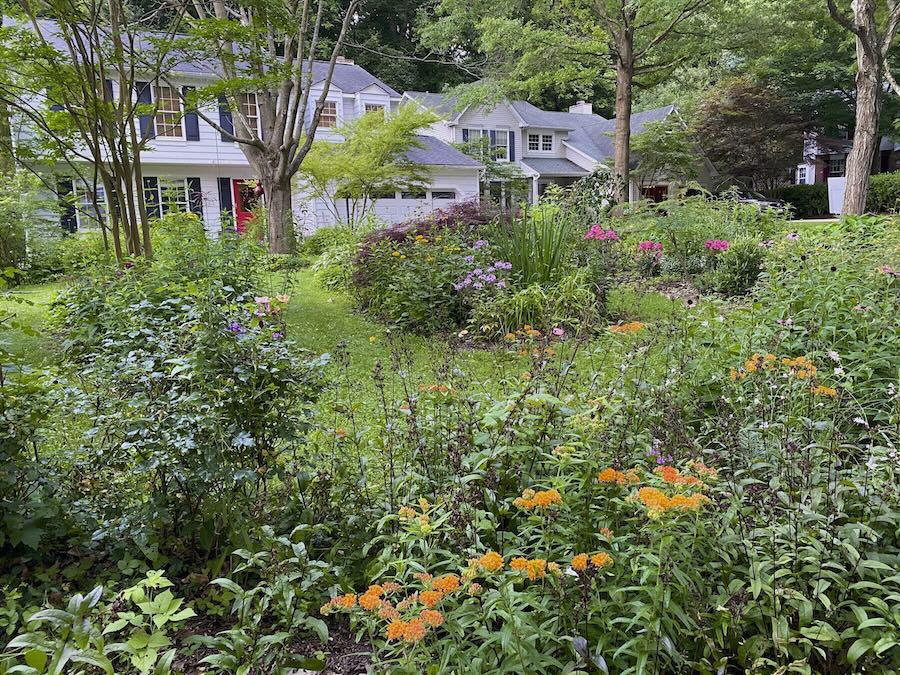
 Nancy: Yeah. Successfully, I’ve been desirous about these kinds of phrases for a really very long time. And I really feel I reached my breaking degree with the phrase overgrown when my sister was going by means of her HOA case, the place they’d been coming after her for her pollinator yard [above], which she lastly managed to save lots of a number of and help get a state regulation handed.
Nancy: Yeah. Successfully, I’ve been desirous about these kinds of phrases for a really very long time. And I really feel I reached my breaking degree with the phrase overgrown when my sister was going by means of her HOA case, the place they’d been coming after her for her pollinator yard [above], which she lastly managed to save lots of a number of and help get a state regulation handed.
Margaret: And so this was her home-owner’s affiliation; totally different people complained, and this was a case in Maryland that turned a check out case, a really crucial case. Positive?
Nancy: Yeah. Yeah. Our state delegates in our county took it on, and drafted some legal guidelines to forestall this from occurring to totally different people residing in HOAs, and it handed. So yeah, so it was an efficient manner of making lemonade from lemons. Nevertheless I really feel all through that time, positively loads of the citations my sister had been getting known as her yard “overgrown.” And at any time when people contact us about citations they get each from their HOA or from weight inspection corporations, that’s typically one amongst these stopping phrases, I identify them, which can be utilized [laughter].
And so I merely started to think about what’s another option to that, by means of how we are going to reframe this dialogue, because of it’s practically like people use it as a default. And as I well-known in my article on my web page, when “The New York Cases” did their day-after-day e-mail digest that week that they wrote about Janet’s case a few yr previously, the person writing the e-mail described her that she obtained the wrestle to take care of her overgrown yard or one factor like that. And he’d under no circumstances seen it. He’d merely possibly given the article a cursory study. And it merely struck me that it was a way that he had chosen to put in writing down his little teaser. And it’s not even one of the simplest ways that the reporter, Cara Buckley, who wrote the article, described her yard. Nevertheless it absolutely’s just so embedded in our minds {{that a}} backyard is a “tidy and common and pretty,” and that something is overgrown. So, yeah.
Margaret: Correct. So it obtained me contemplating, your publish, every the Instagram and the longer one on the Humane Gardener web page. It obtained me contemplating really of how robust the subject and the language spherical gardening has turn into. And likewise you and I’ve talked about this offline considerably bit, nonetheless I want to focus on it out loud considerably bit, too. Notably throughout the ultimate decade.
I’ve been gardening for possibly 40ish years or one factor, and I’ve been writing about it for 30-something of those years, I assume. And the pressure between our one-time image of a “yard”—which was taken or derived from the English pretty picture books. It was a spot the place administration was a benefit, and it was all a few pretty picture-perfect place or scene that was created.
After which now fast-forward, we’ve realized so much additional regarding the ecosystems and about creating habitat and the alternative points that we are going to do as gardeners other than make pretty footage [laughter]. And to not say that we shouldn’t make pretty footage. I am not saying it must be each/or. And that’s the issue.
And so now as you and I’ve talked about, if I write a story about one factor native in “The New York Cases” yard column, and even on the weblog, among the many people get mad because of they want to know… They suppose it appears to be—the phrase they usually use is “messy” [laughter] and they also don’t want one factor messy. After which if I write about non-native points which might be what we used to call ornamental, then all folks will get mad who says, “Nevertheless that’s not native. Why are you writing about it?” [Laughter.]
Nancy: Correct, correct.
Margaret: Sorry, that was long-winded. Nevertheless what I suggest, it’s this rigidity. And likewise you’re correct, the language, there’s loads of triggering—to utilize a updated phrase—triggering language, too. [Below, a path in Nancy’s garden.]
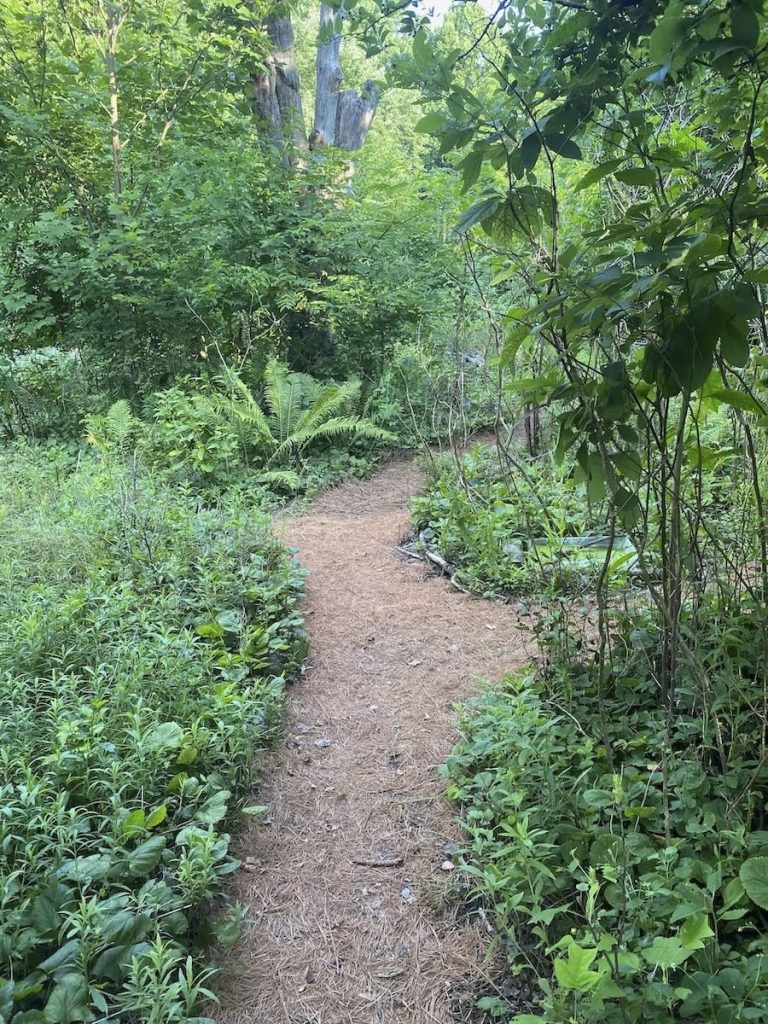
 Nancy: Yeah. Yeah. And as soon as I posted that publish ultimate week on Fb, there was loads of response from people who had been captivated with probably having a model new resolution to debate points with that phrase “undergrown.” Considered one of many antagonistic suggestions that I obtained was from a person who was really upset that I didn’t current substitute phrases.
Nancy: Yeah. Yeah. And as soon as I posted that publish ultimate week on Fb, there was loads of response from people who had been captivated with probably having a model new resolution to debate points with that phrase “undergrown.” Considered one of many antagonistic suggestions that I obtained was from a person who was really upset that I didn’t current substitute phrases.
And all the degree is that we don’t should see the whole thing on a regular basis… We don’t should label the whole thing. We don’t should see the whole thing on a regular basis in such black and white phrases. And so for me, a substitute time interval is missing that total degree. It obtained me desirous in regards to the fact that there are many renaming campaigns now, like with renaming the Audubon Society, and renaming fowl names.
Margaret: Positive, positive.
Nancy: And other people, you do desire a substitute. You do need one different phrase for in the event you occur to’re going to change the determine of a fowl who’s named after any individual from the 18th century, and in addition you want to make it a additional human-friendly and bird-friendly species determine now.
Nevertheless these totally different phrases, loads of them that I was talking about in that publish, are conceptual phrases. So that you just don’t need another option to an opossum, you don’t have to call that… In case you’re calling that opossum a pest, properly, he already has a fame. He’s an opossum [laughter]. In case you’re calling a violet a weed, properly, the violet already has a fame. The violet is a violet. And so it’s additional about looking at how we categorically lump points collectively as each good or unhealthy, and easily trying to see if people can take a step once more from that.
Margaret: Correct. As I acknowledged, certainly one of many alternative phrases that I’m usually assaulted with is that seems “messy.” And I was desirous about, properly, what do they suggest messy? Do they suggest baby of wildish or do they suggest unfastened? Do they suggest looser than formal? Do they suggest naturalistic? Do they suggest full, bountiful? Are you conscious what I suggest? Might we free-associate considerably bit [laughter], stop merely slandering one another and yelling at each other?
Nancy: Yeah, exactly.
Margaret: That’s all. And I agree with you that we shouldn’t basically should, because of a violet is a violet, and opossum is an opossum. Nevertheless the overall scene, versus holding onto a picture that only one picture—a correct, rigid, well-mown and manicured to the Nth diploma picture—is the one picture that’s O.Okay. Might we as a substitute consider phrases like looser and naturalistic and full and bountiful? Might we consider these phrases versus overgrown, messy [laughter]?
Nancy: Yeah. Yeah, for sure. Successfully, individuals who discover themselves using the phrase messy, they don’t even have the naturalistic vocabulary of their head though, do they?
Margaret: No, no, you’re correct.
Nancy: They’re contemplating straight traces, flat mode. So yeah, it’s like there’s the absence of it, after which there’s the ample presence of it. And when individuals are contemplating in these two extremes, these are the phrases they fall once more on.
Margaret: Yeah. In your weblog publish, you made an fascinating degree, which is that you just say, “You in all probability have a turfgrass backyard on most of your property, your yard isn’t in actuality, pristine. It’s undergrown.” And you then definately say, “In case you or your backyard service agency apply herbicides, pesticides, synthetic fertilizers, your yard is simply not immaculate. It’s contaminated.”
Nancy: Yeah.
Margaret: Correct? Each set of language, we are going to take a look at otherwise, and it’s not immaculate. There’s one different story behind it, which is that we’ve killed off loads of the life to make it behave that methodology. Yeah. We’ve subdued it. We’ve subdued issue…into submission, I suggest. By that I suggest into submission.

 Nancy: Correct. And it partly has to do with a number of of those points that if we’re solely looking at what’s correct in entrance of us and by no means considering the additional hidden outcomes, then what people do see is one factor attention-grabbing, although I don’t know why that’s attention-grabbing to them, solely an enormous expansive inexperienced grass [laughter], however it’s merely what individuals are used to, I really feel. So there’s the sight draw back, the place they’re not desirous about points which will very properly be out of their view, the outcomes, nonetheless then there’s moreover contemplating from the angle of the alternative organisms, the alternative residing beings who should share that land and the way in which they might see it or sense it in a number of strategies.
Nancy: Correct. And it partly has to do with a number of of those points that if we’re solely looking at what’s correct in entrance of us and by no means considering the additional hidden outcomes, then what people do see is one factor attention-grabbing, although I don’t know why that’s attention-grabbing to them, solely an enormous expansive inexperienced grass [laughter], however it’s merely what individuals are used to, I really feel. So there’s the sight draw back, the place they’re not desirous about points which will very properly be out of their view, the outcomes, nonetheless then there’s moreover contemplating from the angle of the alternative organisms, the alternative residing beings who should share that land and the way in which they might see it or sense it in a number of strategies.
Margaret: Which is so much what your second e-book, “Wildscape” is about, is listening and smelling and touching and tasting and so forth in behalf of the entire creatures, really letting our doorways of perceptions open up of their behalf.
So that you just say one factor else fascinating on this weblog publish, which is that, over time as you’ve explored these false dichotomies which had been organize language-wise, and in addition you’ve requested scientists even, “Why can we are saying this? Why can we are saying that?” And one was “pest” versus “helpful insect.” Inform us about that one. How did we discover your self doing that, setting them up as if there’s two models of bugs?
Nancy: Yeah. I was struck by that after I did my first Grasp Gardner teaching in 2005, and I had already been engaged on the Humane Society for quite a few years and was very acutely aware of the damage that the phrases “pest” and “nuisance” may trigger in relation to mammals by means of people’s perceptions of them. After which I took this class and there’s total sections of the information on pest bugs and helpful bugs, and the first question is, properly, helpful to whom, and pests to whom? Because of there have been loads of bugs in there that everyone knows are actually helpful to birds and totally different animals that had been being labeled as pests.
And so I requested a number of fully totally different entomologists as soon as I did my first e-book, the place that bought right here from, and they also had been equivalent to, “Successfully, it’s primarily a promoting time interval, and it’s to try to get people to like some bugs, nonetheless in any case like some bugs, and depart them alone.”
So there was a optimistic intent behind trying to present you that phrase, helpful. Nevertheless I really feel it usually makes people say, anytime they meet a model new insect of their yard, “Oh my gosh, is that this good or unhealthy?” And it models up that binary contemplating immediately [laughter]. And within the occasion that they go look on-line, they might be taught that it’s unhealthy when it’s really not.
Margaret: Correct. Successfully, the place’s the street of… Yeah, the place’s the street of demarcation, so to speak, when you could have a black to white, a antagonistic to optimistic, a continuum, the place do you place the… The place’s the spot the place you go over the sting?
With the “helpful,” I get why they’re saying it was a promoting issue, and it’s labored throughout the sense that in some other case, all the images I’ve of individuals are like that scene throughout the “Annie Hall” movie or irrespective of, the place there’s a spider throughout the bathroom and she or he sends Woody Allen in to get it or irrespective of. Nevertheless everybody appears to be afraid of arthropods, bugs and totally different arthropods… Successfully of most animals, frankly.
And so I assume I’m glad that they put a spin on a number of of them, however it has probably backfired by this degree, positive, positive, as properly.
Nancy: And as we’re talking about it, I hadn’t really considered this on this methodology sooner than, nonetheless, so take it, as an example, a caterpillar. There’s Golden… What are they known as? Golden Guides that had been printed?
Margaret: Positive. Sure, sure. Positive.
Nancy: Yeah. So as soon as I used to be little, I would buy them on the grocery retailer [laughter]. I nonetheless have one known as pests, and it has caterpillars in it, like butterfly caterpillars, and they also’re throughout the pest e-book. And it’s not that people identify them now helpful each, nonetheless they don’t identify them pests anymore because of they know that they feed birds and they also’ve-
Margaret: Positive, just because they chew holes in a number of of your vegetation doesn’t suggest that they’re pests. People who destroy a complete native species of bushes, as an example, I really feel these deserve to remain throughout the pest class. Are you conscious what I suggest? I really feel the hemlock woolly adelgid is a pest insect; it’s considerably bit fully totally different form of animal, nonetheless yeah.
Nancy: Yeah. Although the used to the phrase, though, I do know what you’re saying, nonetheless I merely consider the reality that, O.Okay., so the place that animal is from, they’re not possibly a pest [laughter].
Margaret: No, fully not. And that’s why I really feel after we focus on invasive or alien or irrespective of you want to identify it, imported, however we want to focus on it, it’s essential to know that when it’s not in its pure habitat, it’s going to get uncontrolled. It’s not that it’s innately uncontrolled, it’s that folks have transported right into a spot the place it’s… Speaking of that pecking order that we’ve started regarding the birds [laughter], the order is simply not proper right here, and they also’re strangers in an odd land, and it’s gone to hell.
So that you just moreover focus on one different really loaded and sophisticated phrase, which is “weed,” which is, yeah. I’ve clearweed and jewelweed, which clearweed, Pilea and jewelweed an Impatiens species, vegetation that I like, and plenty of creatures proper right here do, bugs along with throughout the case of the jewelweed, the hummingbirds. Nevertheless their names, their frequent names have “weed” in them.
Nancy: And I can’t keep in mind if we talked about this sooner than, nonetheless as soon as I first started gardening proper right here, I ripped out jewelweed and pokeweed attributable to their names, and since I would see them listed as weeds, and I didn’t know any greater. So it’s positively harmful for sure to have them of their frequent names. After which over time, it’s made me… I try to not use that phrase. I try to stay away from it it does not matter what, because of I really feel it’s so sophisticated to people. And so if I’m talking about one factor like a flooring ivy or creeping Charlie, I’ll say a non-native which will push out natives and take over wildlife habitat. Now that’s a protracted issue to say, nonetheless in any case it’s additional actual.
Margaret: Yeah. I’m nonetheless once more on the “non-native thug.” [Laughter.] My fast mannequin is “non-native thug” for a number of of those groundcovers that erroneously, we launched. As soon as extra, loads of them had been launched each unintentionally or because of we thought they’d been going to be good yard vegetation, and they also’ve gotten uncontrolled. So I take into account them as non-native thugs. Nevertheless equivalent intention to what you acknowledged.
Nancy: Correct. Correct.
Margaret: So I assume that the rationale that you just wrote about it is that you just want to focus on this out loud, correct? This can be a essential dialog for us all to have considerably than merely condemn “overgrown yards” and suppose that’s going to get us wherever. Yeah?
Nancy: Yeah. And I started doing talks on this vocabulary framework spherical 2013 or so, and sooner than I wrote my first e-book, after which I used that framing as a number of of what I wrote about in there. Nevertheless I noticed I had under no circumstances really put it multi operate place. And so it’s been bothering me that I don’t have it written down like that someplace. And as well as since then, I’ve added additional phrases to my pet-peeve phrases [laughter]
And yeah, I do suppose we spent loads of time in my sister’s HOA case dismantling a number of of those phrases, every on the hearings and throughout the newsletters to the group and stuff.
And I do suppose that when people start to think about it, some people get upset, nonetheless I didn’t hear from as a number of these this time as I’ve on among the many totally different points I’ve posted. For in all probability probably the most half, even people who’ve loads of backyard are saying, “Yeah, you really made me consider this,” or, “I’ve been questioning tips about the right way to physique this.” So, I’d like to have the power to easily see these phrases loosen up considerably, if not fully go away, because of that’s possibly not lifelike. Merely in any case try to have people talking in a additional expansive methodology regarding the vegetation and animals spherical them.
Margaret: Yeah. So I actually really feel like, as soon as extra, I want to go exterior—when the snow and ice soften [laughter]—and I want to free-associate about what I’m seeing. I want to take into account the model new… the fully totally different adjectives?
Nancy: Yeah. Yeah.
Margaret: Yeah. I actually really feel like that’s an practice we would all do. With the giveaway in your e-book, what we’ll do is that the question that people should reply throughout the suggestions to enter to win shall be to free-associate about one amongst these phrases with us. So I’ll consider that, but-
Nancy: That’s a tremendous idea.
Margaret: Yeah. So let’s get some help with this. Correct? [Laughter.]
Nancy: Yeah.
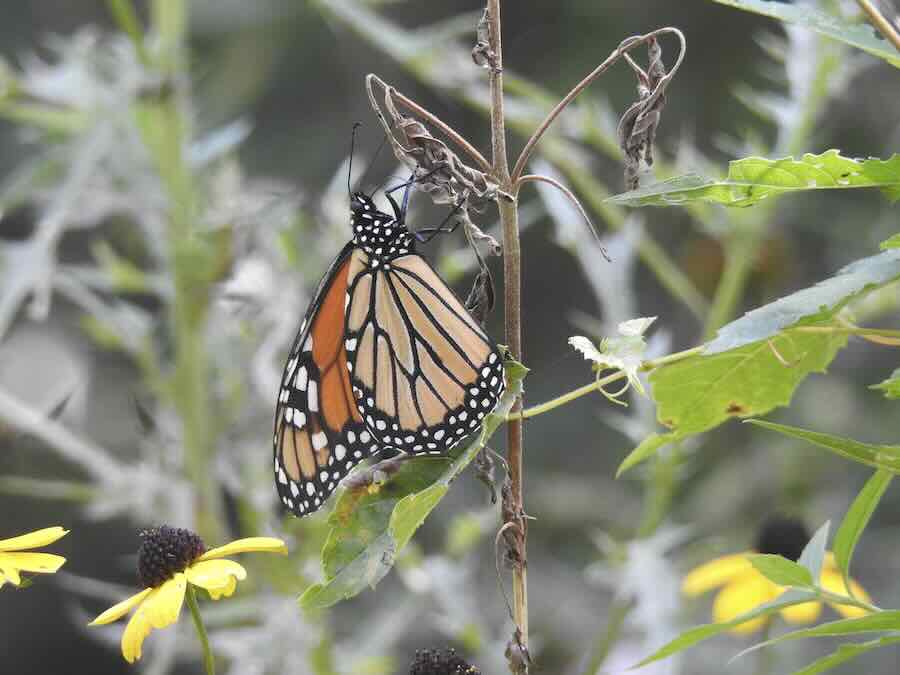
 Margaret: So throughout the ultimate minute or two, so what else is in your ideas correct now? It’s this, you wished to get this down, and what else is excessive of ideas correct now?
Margaret: So throughout the ultimate minute or two, so what else is in your ideas correct now? It’s this, you wished to get this down, and what else is excessive of ideas correct now?
Nancy: Yeah. Successfully, I’ve one factor throughout the works on coloration, and the way in which our custom is so geared in direction of the neutrals [laughter], and the historic causes for that. Because of I’ve been learning some points about that, and I merely suppose it’s really fascinating the way in which it might apply to our typical panorama choices.
Margaret: Oh, not a subject I do know one thing about. Fascinating. I’ve loads of screaming gold stuff, so I’m probably throughout the totally different end of the-
Nancy: [Laughter.] Yeah, I really feel you is perhaps.
Margaret: My house is darkish inexperienced with reddish-orange trim, so I could also be on the alternative end of the crazy…[laughter].
Nancy: Yeah, I prefer it.
Margaret: Yeah. Yeah. Successfully, I’m on a regular basis glad to speak to you, and like I acknowledged, I was really glad to study this just because points have modified and customarily, I’m uncertain if I’ve my footing. I see the suggestions, like these you get usually, too, that you just had been speaking about. And I don’t know, am I missing one factor? And I want to open up and suppose additional extensively, and carry out a bit of of this free-associating and so it was provocative to me what you wrote, and I thanks for it.
Nancy: Thanks. Thanks so much in your curiosity. I like talking with you, Margaret.
(All images from Nancy Lawson at The Humane Gardener.)
additional from nancy lawson
enter to win a replica of ‘wildscape’
I’LL BUY A COPY of “Wildscape” by Nancy Lawson for one lucky reader. All it is advisable do to enter is reply this question throughout the suggestions subject underneath:
What phrases as a substitute of “overgrown” or “messy” would you advocate to clarify a looser, native-heavy entrance yard, the place mown backyard isn’t the first design ingredient? Help us free-associate for some greater phrases!
No reply, or feeling shy? Merely say one factor like “rely me in” and I am going to, nonetheless a reply is even greater. I’ll resolve a random winner after entries shut at midnight Tuesday, Feb. 6, 2024. Good luck to all.
(Disclosure: As an Amazon Affiliate I earn from qualifying purchases.)
favor the podcast mannequin of the current?
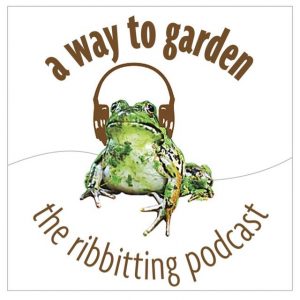
 MY WEEKLY public-radio current, rated a “top-5 yard podcast” by “The Guardian” newspaper throughout the UK, began its 14th yr in March 2023. It’s produced at Robin Hood Radio, the smallest NPR station throughout the nation. Listen domestically throughout the Hudson Valley (NY)-Berkshires (MA)-Litchfield Hills (CT) Mondays at 8:30 AM Japanese, rerun at 8:30 Saturdays. Or play the Jan. 29, 2024 current using the participant near the best of this transcript. You can subscribe to all future editions on iTunes/Apple Podcasts or Spotify (and browse my archive of podcasts proper right here).
MY WEEKLY public-radio current, rated a “top-5 yard podcast” by “The Guardian” newspaper throughout the UK, began its 14th yr in March 2023. It’s produced at Robin Hood Radio, the smallest NPR station throughout the nation. Listen domestically throughout the Hudson Valley (NY)-Berkshires (MA)-Litchfield Hills (CT) Mondays at 8:30 AM Japanese, rerun at 8:30 Saturdays. Or play the Jan. 29, 2024 current using the participant near the best of this transcript. You can subscribe to all future editions on iTunes/Apple Podcasts or Spotify (and browse my archive of podcasts proper right here).
[ad_2]
Provide hyperlink

